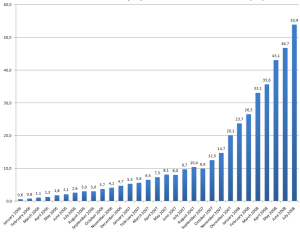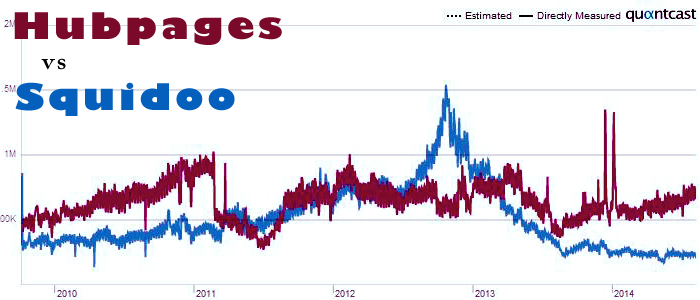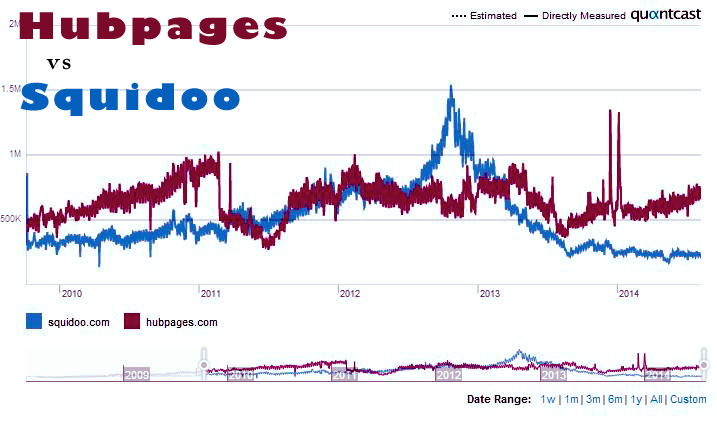Start Blogging, not Managing Websites
When you start to learn how to make money blogging, one of the big challenges is the steep learning curve. There are many more issues, and we will touch them one by one, but the biggest problem for a beginner is the learning curve. You just don’t know what to do, how to manage your website, how to setup a website, and not even how to write. Don’t feel offended here, you are a good writer, otherwise you wouldn’t even think about this business, but writing online, especially writing to make money, is something you have to learn. Even the most talented writers need some training for writing online. More about this later.
The most important thing for new bloggers is to focus on what matter most for them, writing. Too many bloggers start managing websites, and doing SEO, and learning things that they don't really need as writers, rather than focus on their main objective: write great content for their readers.
The Best Platform to Start a Blog
If your intention is just to start blogging, to get used to it, or because you just want to blog and a financial retribution is not your concern, then you have a few great options.
All the following options are great, but in my experience the best for getting visitors is blogger.com. Now read on to see how the other platforms fare, they are certainly not bad.
- WordPress.com
WordPress is the most popular blogging platform, and it is the choice of CMS, (content management system), for low budget websites. You can start blogging at WordPress.com for free, this will smooth out the learning curve. WordPress has a paid hosting option as well, you can stick with them when you go pro, however, there are many other option for paid hosting. - Tumblr.com
Tumblr is an extremely popular blog platform, where everybody can get a free account. Tumblr is the choice of many young people, and many bloggers are just doing it for fun. There is a lot of interaction between bloggers, they comment on each other's posts, and they reblog interesting posts, it is a very active community. There are many serious blogs as well, so this could be a great option for a start. Tumblr is a Yahoo company. - Blogger.com
In my experience blogger.com, Google's blogging platform is the best to get traffic, if you have good content. Blogger.com has many tools to make your blog an authority, like integration with social media, and Google's authorship program. They even have an add-on to include adsense ads into your posts, so you can monetize. - Livejournal.com
Livejournal is a very popular blogging platform, and it is the choice of many bloggers. It is an intuitive platform, easy to use, and it has a lot of active communities. If you don't know what is good for a blogging community, it's great for interaction and for promoting your content. You posts will not get any attention without the support on an active community. That happens even if you are the most skilled writer... Livejournal also has advanced account as an option, in the case you get very serious with your blogging.
Overall, my personal favorite free blogging platform is blogger.com. The fact that I can monetize, and because it brings more traffic than other platforms makes it the most appealing for me.
Community Blogging Platforms – Great for Making Money Online
I have my own opinion about what's the best way to start blogging for money, and that opinion is based on my experience. However, I was looking at what other people are saying on the subject, and I stumbled upon +Tipsandtricks-HQ's webpage about how to start a blog and make money online. The article is pure gold as a resource, no doubt about it. You just follow everything in that article, and the linked content, and you will make money, 100%. But let's face it, the amount of work looks overwhelming, even for experienced writers.
Now back to my way of doing it; the best option for a beginner online writer is to write on a community blogging platform, such as Squidoo or Hubpages. And I resume my comparison to these two, because they are the two websites that can make you money.
 There are many other community website platforms, and they have their advantages and disadvantages. We should probably mention at least Infobarrel, which is a decent platform. Some other popular platforms are also Bubblews, which I personally don't like, Helium, which doesn't compare to the first three, Triond, Xomba, and many others, that I won't bother to mention. I will mention though Yahoo Voices, which is a great option, especially if you create evergreen content, and if you write articles on their niche. They pay 1.50 per 1000 views, and if you have a great article, you can easily get 1000 views per day. Anyway, Yahoo Voices is not my choice of platform, and is not a community website platform, although is a great way to get some revenue from writing on WEB.
There are many other community website platforms, and they have their advantages and disadvantages. We should probably mention at least Infobarrel, which is a decent platform. Some other popular platforms are also Bubblews, which I personally don't like, Helium, which doesn't compare to the first three, Triond, Xomba, and many others, that I won't bother to mention. I will mention though Yahoo Voices, which is a great option, especially if you create evergreen content, and if you write articles on their niche. They pay 1.50 per 1000 views, and if you have a great article, you can easily get 1000 views per day. Anyway, Yahoo Voices is not my choice of platform, and is not a community website platform, although is a great way to get some revenue from writing on WEB.
There are so many reasons these type of blogging platforms are better for non technical people, and for beginners, but I will try to list as many of these reasons as possible.
- The platforms are old, the websites rank well on search engines, and good content is bound to get visitors.
- The format of these websites is well thought, well tested, and it is optimized for reading, for SEO, and for monetization
- The community is very active for both platforms, and if you ask for help you will find it.
- The platforms have human editors, who will select the best pieces of content, and promote them. Once promoted content will get a lot of traffic.
- They will stop you from doing bad things that will hurt the overall ranking of the website.
- Your article will rank very easy, compared to your own websites. This means traffic, traffic means money.
Now there are some downsides as well to using someone elses website, and you have to keep this in mind, and not hold all of your eggs in the same basket. As you expand your web writings portfolio, make sure you diversify the platforms you are writing on. Some of the things that I don't like about writing for a community blogging website are:
- You do not control your content, although you are the owner of the content you publish, the website's owner can take down your content, if they wish to. If they decide they don't like your content, they won't publish it.
- Antispam control can be very tight at times, and prevent you from publishing great articles.
- Spammers target these type of sites, because promoting on Squidoo and Hubpages can improve their website rankings. Search engines penalized a few times social blogging platforms for allowing these type of content. Even though they implemented greater control over published content, that doesn't mean spammers will stop.
- A penalty of your blogging platform can bring your revenue down consistently.
- The worst thing about them is that you don't have control over the platform, so whatever the platform's owners decide, you have to accept. Now if you are a beginner to blogging, it is in fact an advantage, because they know better than you what needs to be done.
- That includes subjects that are prone to spam. You might have a useful, great article, if the editorial team feels like it's bordering the spam area, they won't approve it for publishing.
- These platforms are the target of spammers, and they will steal your articles and publish them as theirs.
Although these type platforms are not perfect, they are the best start point for someone who wants to make some money while learning and experimenting with blogging for money. Start with the two I mentioned, Squidoo or Hubpages, I think they are the best ones, and the community is great. As you gain experience, you can start your own blog. By then you will understand the niche concepts, you will have developed a solid understanding of writing on WEB, and promoting your content using social media.
If your portfolio with the two blogging platforms is big enough, and you would like to put your eggs in more baskets, you can also look at Zujava, and Wizzley. Many people love these two platforms, and they have a lot of articles there. I had only bad experiences with them, I have never been able to publish an article. Zujava seems like a one man show, and this impacts the ability to effectively bring in new writers. Wizzley is overly cautious about web spam, which is not a bad thing, but they refuse publishing articles, and they don't offer any useful explanations about it. Just generic. Make sure you participate in their forums, and ask for help and feedback, before giving up, like I did. I suspect these sites will do well in the future, at least Wizzley, if not both.
Best Blogging Platforms to Monetize – HubPages vs Squidoo
Hubpages vs Squidoo - the Best Blogging Platform
Both Squidoo and HubPages are user generated content website, with a revenue sharing format. There are many similarities, but many differences as well, between the two sites. Some of the facts I present here are measurable, some are a bit speculative, you are invited to discuss them in the comment section.
Squidoo launched in 2005, and was founded by Seth Godin, Megan Casey, Gil Hildebrand, and Corey Brown. This makes Squidoo almost 9 years old at the time of writing this.
HubPages launched in 2006, founded by Paul Edmonson, Paul Deeds, and Jay Reitz, former Microsoft employees. This makes the site only one year younger than Squidoo.
Hubpages generates more traffic than Squidoo, according to Quantcast, so you have a slightly better chance for more visitors with them. The additional traffic is maybe a result of HP investing more time and human resources to review content. In turn, search engines rewarded them with better ranking. Although Squidoo was slower to implement the same measures, they recently focused on cleaning up spam, and rewarding great content.
A Bit About The Content Structure
The major difference is that HubPages give every user a subdomain, and the user is responsible for that subdomain. This bears the greatest advantage, that at anytime the user is somewhat isolated into the subdomain, and if a search engine will penalize that subdomain, this will be easy to be contained. It is also a great way to stimulate self promotion, because it's easier to promote your own subdomain. Squidoo has also made some tests with subdomains, but in the end they decided to interrupt the migration of all the accounts to this model.
A new initiative of Squidoo was to promote hand-picked content on thematic subdomains. This is actually one of the best changes in the latest years, with great results. Each of the approaches has its own advantages, but the theme subdomains seem more powerful because of the size of such a subdomain.
HubPages name their content units hubs, Squidoo name theirs lenses. I am not particularly fond of this naming convention, but I got used to it eventually. The naming convention seems to have caught up in general, because other shared revenue websites copied the idea. Zujava, for instance, names their content units leaves.
The Monetization
 Since you are doing the blogging thing for money, it makes sense to have a good idea on how the two platforms compare. Both of the two use Adsense, eBay, Amazon, and other advertising networks for monetization.
Since you are doing the blogging thing for money, it makes sense to have a good idea on how the two platforms compare. Both of the two use Adsense, eBay, Amazon, and other advertising networks for monetization.
In my experience, HubPages works better with articles that don't necessarily promote goods. Affiliate type of content works better on Squidoo, because the conversion rates are better. There is something magical about Squidoo's layout that makes the visitor click on Amazon links.
On the other hand, if you have articles that don't necessarily sell a product, but can generate traffic, HubPages is better. This doesn't mean you can't have successful content articles on Squidoo, and successful sales articles on HubPages. As a matter of fact, there are many examples that contradict me, it's almost unfair to make such a classification, but that's my perception, and it is subjective.
Amazon sales sharing model is now the same for both. Not long ago, HP used to share the displays of Amazon products, this was good for the site, but not as good for the writer. Now both Squidoo and HubPages use the same model. They display their own Amazon ID everytime, and split the revenue with you. This helps the writer to get better tier revenue.
Advertising revenue looks a bit better on HubPages, and this is for two reasons:
- HP splits the Adsense views with you, so whatever is generated during "your advertising time" is yours. On the other hand, Squidoo has a general advertising program, which favours the best ranking lenses, (articles), which are not necessarily the ones that perform best on Adsense.
- Both platforms have other advertising deals, besides Adsense, but Hubpages bring more revenue from these. And again, their revenue sharing method is based on number of views.
HubPages is more fair with all of its writers, whereas Squidoo favors the content that ranks better in all areas. I heard rumors that Squidoo plans to change this, and I think it would be beneficial overall, although I personally might lose a bit of revenue, if that happens.
This approach has the disadvantage that encourages people to generate fake traffic, however, both platforms clean up accounts that are suspected to use fake traffic. So never attempt.
 Traffic - Squidoo vs HubPages
Traffic - Squidoo vs HubPages
If you look at the graphic from Quantcast, you will see how they perform. HP seems the winner, at least at the moment, but this could change anytime. One remarkable thing about HP, in contrast with its competitor, is that they have built a mechanism to generate internal traffic. This is very helpful to generate buzz around new and updated articles, and many times this is critical to push that article in SERP. Just a bit of social media love, and search engines will pick up the users' vibe. On Squidoo you as an author, need to know how to promote your work, otherwise, you are relying solely on search engines.
If you look at the graph from Quantcast, you will note that HubPages has a bit more traffic. This obviously, helps you get more traffic on your articles, and helps your articles make you money. However, a significant portion of the HubPages' traffic comes from internal links, compared to Squidoo which gets most of its traffic from search. This is an advantage for Squidoo, because the stats are not polluted with internal traffic, which brings in some money, but not too much.
The objective is to build a passive income, so think wisely about your approach. While HP may seem a bit more attractive, because every time you update an article it directs users to your updated comment, you still have to work and update that piece of content to get those visitors. In other words you have to work. The initial traffic flury from updates and new published articles lasts for two or three days, so it's not going to bring you tons of traffic, but as I said before, it will give your content a kickstart.
For more insights about how the two platforms compare, check GreekGeek's article about Hubpages and Squidoo.
My personal preference is Squidoo, but if you have a great subject, and you are not selling, articles can easily get viral at Hubpages.
What is your experience with shared revenue websites? Which one you prefer? I'd like to hear your opinions.



